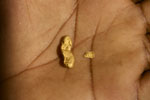
Conflict minerals are steadily gaining prominence in the public debate over how to address the conflict in eastern Congo, paving the way for meaningful advocacy directed at the companies that benefit from Congo’s turmoil.
A piece in yesterday’s Boston Globe emphasized the importance of new legislation championed by Washington State Congressman Jim McDermott (D) that addresses the complex path minerals take from mines in eastern Congo all the way to electronics devices. Currently, the minerals pass through so many hands, undocumented, that it is difficult to hold companies responsible for doing business with warlords in eastern Congo – or certify that their electronics products are conflict-free. But the atrocious conditions in the mines and the unspeakable violence against women and girls that the mineral trade is helping to fuel demand accountability.
Armed groups “are simply stealing ore and selling it to the international market,’’ McDermott said, according to the Boston Globe, and “everyone who has a cell phone has a piece of the action.’’ The Conflict Minerals Bill would set up a system to audit the trade in three minerals prevalent in Congo – tin, tantalum, and tungsten – and certify whether they originated in a conflict-free mine or not. U.S. companies would then have to indicate whether their products contain conflict minerals before importing them into the United States.
A representative from Cabot, one of the world’s leading producers of tantalum products, was quoted as saying that a challenge the industry faces is ensuring their supply chain is conflict free without sidelining the legitimate companies dealing in minerals. (Importantly, Cabot doesn’t do business anywhere in the region, according to the article.) Some mining companies are “just trying to make a living like the rest of us,” Cabot’s Andrew O’Donovan said. However, “today there is no system in place to determine the good from the bad,’’ he added.
The link between Congo’s minerals and the conflict in the east also came out clear in the U.S. State Department’s 2009 human rights report on Congo, issued last week:
“In North and South Kivu, the illegal exploitation by some FARDC units, armed groups such as the FDLR, and PARECO of natural resources–including cassiterite (a tin oxide) and columbite-tantalite (or coltan), both of which were used in the global electronics industry—continued to prolong the conflict, facilitate the purchase of small arms to commit abuses, and reduce government revenues needed for increasing security and rebuilding the country. FARDC and FDLR forces in both Kivu provinces forced civilians to work for them or relinquish their mineral production and extorted illegal ‘taxes.’”
Drawing from a number of high-level reports written by U.N. affiliates and NGOs, the State Department expanded upon these details, reiterating some of the recommendations made by the U.N. Group of Experts that would serve to address the abuses. The report also highlighted the U.N. Experts’ finding of "strong indications of high-level protection and in some cases complicity in the illicit gold trade by government officials."
Granted, few people will dig deep into State Department reports to realize how the U.S. government officials are drawing these connections, but it’s important that they are. The combination of growing public awareness, as evidenced through the increasingly frequent articles like the one in the Boston Globe, and government acknowledgement of the problem should send the message to U.S. companies that they would be wise to clean up their mineral supply chains – if not to prevent the exploitation of civilians and the perpetuation of war in Congo, then because a legal gauntlet is likely headed their way.
Photo: Gold in the palm of a miner’s hand (Grassroots Reconciliation Group/Sasha Lezhnev)

